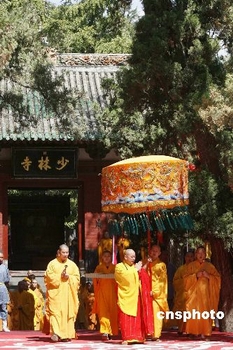Kungfu masters finish seclusion in Shaolin
时间:2006-09-11 07:15:09
(单词翻译:单击)

| Outstanding members of the Global Chinese Kungfu Star Competition end the seclusion1 life in Shaolin Temple Saturday September 9, 2006. |
| Sept. 10 - Finishing a set of fisting, 19-year-old American young man Philip Sahagun was pleased that the seclusion life in a Chinese temple made him understand Kungfu better.
Seclusion is a training method of Zen Buddhism2 which focuses on concentration and meditation3. Shaolin Temple, built 1,500 years ago, is the birthplace of Zen Buddhism. Philip Sahagun was one of 36 Kungfu practitioners5 from a dozen countries to have a nine-day seclusion in the Shaolin Temple in central China's Henan Province. The seclusion ended on Saturday. The practitioners were outstanding members of the Global Chinese Kungfu Star Competition starting March this year, which was jointly6 organized by the Shaolin Temple and Shenzhen Satellite TV Station in south China. During the seclusion, they not only learned Kungfu skills from Shaolin's 18 Kungfu monks7, but had lectures on Buddhism and Kungfu history. They wore Kasaya, a kind of costumes of Buddhist8 monks, and ate vegetarian9 meals. To mark the completion of their seclusion, the practitioners performed martial10 arts, or Kungfu. But what they learned was more. "Martial arts are about self-control," said Philip. "We should fight for self-defence, not for violence." Dyra Sao, another practitioner4 from the United States, was impressed by meditation. "Kungfu is not only about fists. Mental power is also important." "Chinese martial arts are part of Chinese traditional culture,"said Shi Yongxin, abbot of the temple. "By holding the competition, we hope to promote Shaolin culture and Chinese martial arts to the world and enhance exchanges with foreign countries, so as to make people cherish peace and health more." The practitioners' performances were scored during the seclusion and the top nine - four Chinese, two Americans, one Russian, one French and one Australian - would go into the final contest later this September.
|
点击 收听单词发音
收听单词发音
 收听单词发音
收听单词发音
1
seclusion

|
|
| n.隐遁,隔离 | |
参考例句: |
|
|
|
2
Buddhism

|
|
| n.佛教(教义) | |
参考例句: |
|
|
|
3
meditation

|
|
| n.熟虑,(尤指宗教的)默想,沉思,(pl.)冥想录 | |
参考例句: |
|
|
|
4
practitioner

|
|
| n.实践者,从事者;(医生或律师等)开业者 | |
参考例句: |
|
|
|
5
practitioners

|
|
| n.习艺者,实习者( practitioner的名词复数 );从业者(尤指医师) | |
参考例句: |
|
|
|
6
jointly

|
|
| ad.联合地,共同地 | |
参考例句: |
|
|
|
7
monks

|
|
| n.修道士,僧侣( monk的名词复数 ) | |
参考例句: |
|
|
|
8
Buddhist

|
|
| adj./n.佛教的,佛教徒 | |
参考例句: |
|
|
|
9
vegetarian

|
|
| n.素食者;adj.素食的 | |
参考例句: |
|
|
|
10
martial

|
|
| adj.战争的,军事的,尚武的,威武的 | |
参考例句: |
|
|
|
- 上一篇:没有了
- 下一篇:Chinese film triumphs at Venice
©2005-2010英文阅读网




